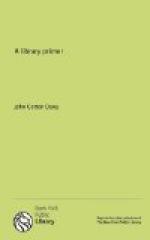Each community has different needs, and begins its library under different conditions. Consider then, whether you need most a library devoted chiefly to the work of helping the schools, or one to be used mainly for reference, or one that shall run largely to periodicals and be not much more than a reading room, or one particularly attractive to girls and women, or one that shall not be much more than a cheerful resting-place, attractive enough to draw man and boy from street corner and saloon. Decide this question early, that all effort may be concentrated to one end, and that your young institution may suit the community in which it is to grow, and from which it is to gain its strength.
Having decided to have a library, keep the movement well before the public. The necessity of the library, its great value to the community, should be urged by the local press, from the platform, and in personal talk. Include in your canvass all citizens, irrespective of creed, business, or politics; whether educated or illiterate. Enlist the support of teachers, and through them interest children and parents. Literary, art, social, and scientific societies, Chautauqua circles, local clubs of all kinds should be champions of the movement.
In getting notices of the library’s work in the newspapers, or in securing mention of it from the lecture platform, or in clubs, and literary, artistic, and musical societies, it is better to refrain from figures and to deal chiefly in general statements about what the library aims to do and what it has done.
CHAPTER III
What does a public library do for a community?
And what good does a public library do? What is it for?
1) It supplies the public with recreative reading. To the masses of the people—hard-worked and living humdrum lives—the novel comes as an open door to an ideal life, in the enjoyment of which one may forget, for a time, the hardships or the tedium of the real. One of the best functions of the public library is to raise this recreative reading of the community to higher and higher levels; to replace trash with literature of a better order.
2) A proper and worthy aim of the public library is the supplying of books on every profession, art, or handicraft, that workers in every department who care to study may perfect themselves in their work.
3) The public library helps in social and political education—in the training of citizens. It is, of course, well supplied with books and periodicals which give the thought of the best writers on the economic and social questions now under earnest discussion.
4) The highest and best influence of the library may be summed up in the single word, culture. No other word so well describes the influence of the diffusion of good reading among the people in giving tone and character to their intellectual life.




